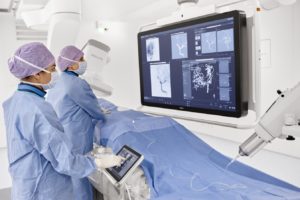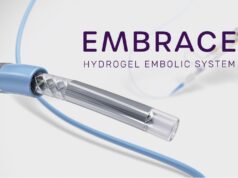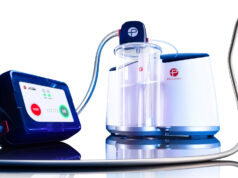
Royal Philips has announced the next-generation of its Azurion image-guided therapy platform, designed to improve the quality and efficiency of interventional procedures. The Azurion platform has been used in over two million procedures worldwide since its introduction three years ago, according to a company press release.
In the past few decades, clinical practices around the world have evolved to successfully treat more patients and perform more complex procedures in interventional labs, the Philips press release noted, adding that with more staff and technologies involved during these procedures, interventional lab environments can become crowded and cluttered. In order to enhance clinician focus and control during procedures, Philips has integrated all the essential lab systems and tools into the new version of the Azurion platform.
The Azurion image-guided therapy platform now integrates control of imaging, physiology, haemodynamic and informatics applications, as well as intuitive control of the gantry, at the tableside, allowing clinicians to control all compatible applications from a single touch screen while performing procedures. This can eliminate the need for clinicians to leave the sterile field and step into an adjacent control room, as well as supporting faster and better informed decision making, the company said.
Philips is also introducing a new 3D imaging solution called SmartCT, where users are guided through image acquisition and can review and interact with the acquired CT-like 3D images on the tableside touch screen module using 3D visualisation and measurement tools. These tools have been designed to support procedures in a range of clinical domains, including neurology, oncology, and cardiovascular procedures.
“Our aim as an innovation company and global market leader in image-guided therapy is to push the boundaries and set new industry standards for delivering an outstanding experience for clinicians, helping them to deliver superior care to every patient,” said Ronald Tabaksblat, general manager image guided therapy systems at Philips. “This next-generation Azurion makes routine cardiovascular procedures more efficient and supports the development of new minimally-invasive techniques to treat complex diseases such as stroke, lung cancer and spine disorders.”
“The integrated platform enables us to efficiently carry out complex interventions at any time using a wide range of functions such as IVUS and iFR co-registration,” said Alexander Becker, head of the cardiac catheter laboratory at the Robert Bosch Hospital, Stuttgart, Germany, and one of the first hospitals to experience the new platform. “The use of the control panel by the examiner is intuitive, combining different sources of information to make patient evaluation much easier and faster.”
Philips adds that the new Azurion platform allows clinicians to easily switch between imaging, physiology, haemodynamic and informatics applications, including SmartCT and IntraSight—a suite of clinically proven iFR, FFR, IVUS and co-registration modalities.
The new Azurion also includes cybersecurity features, high-definition image display capabilities, and advanced remote and proactive services. The platform is available in three versions: complementing the Azurion 3 and 7 variants, Philips now also offers the Azurion 5 to facilitate tailored solutions to address specific customer needs.










